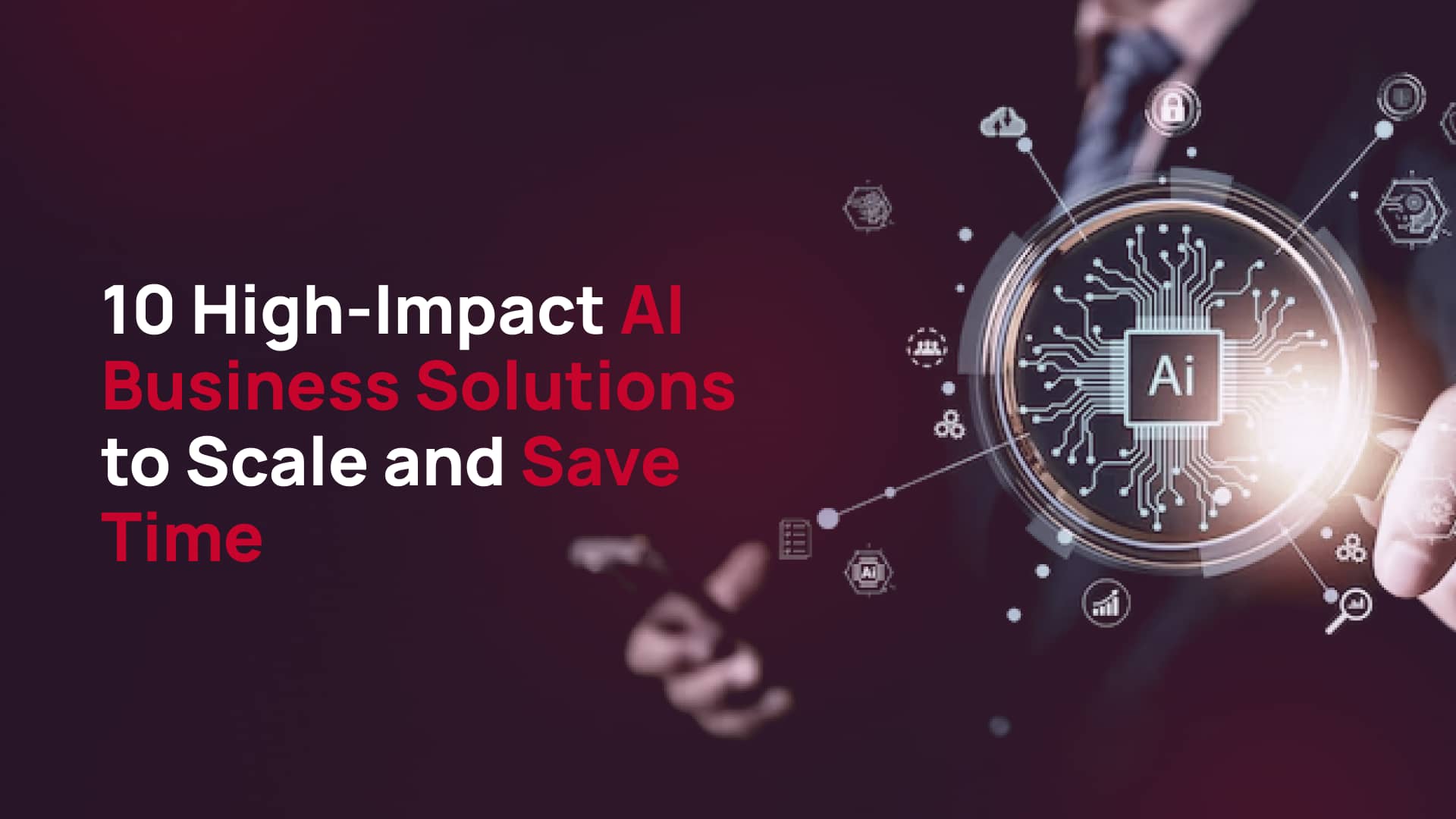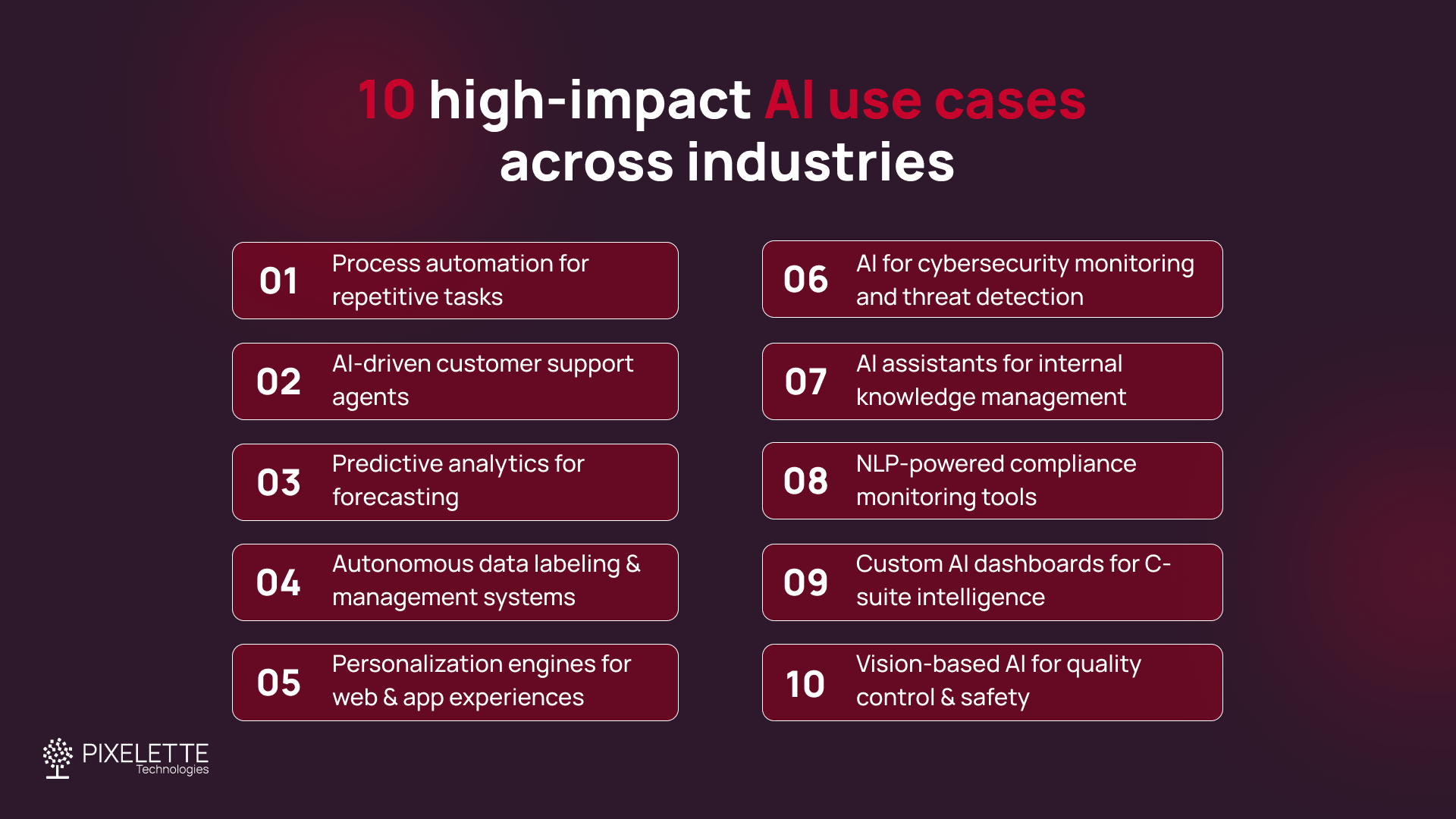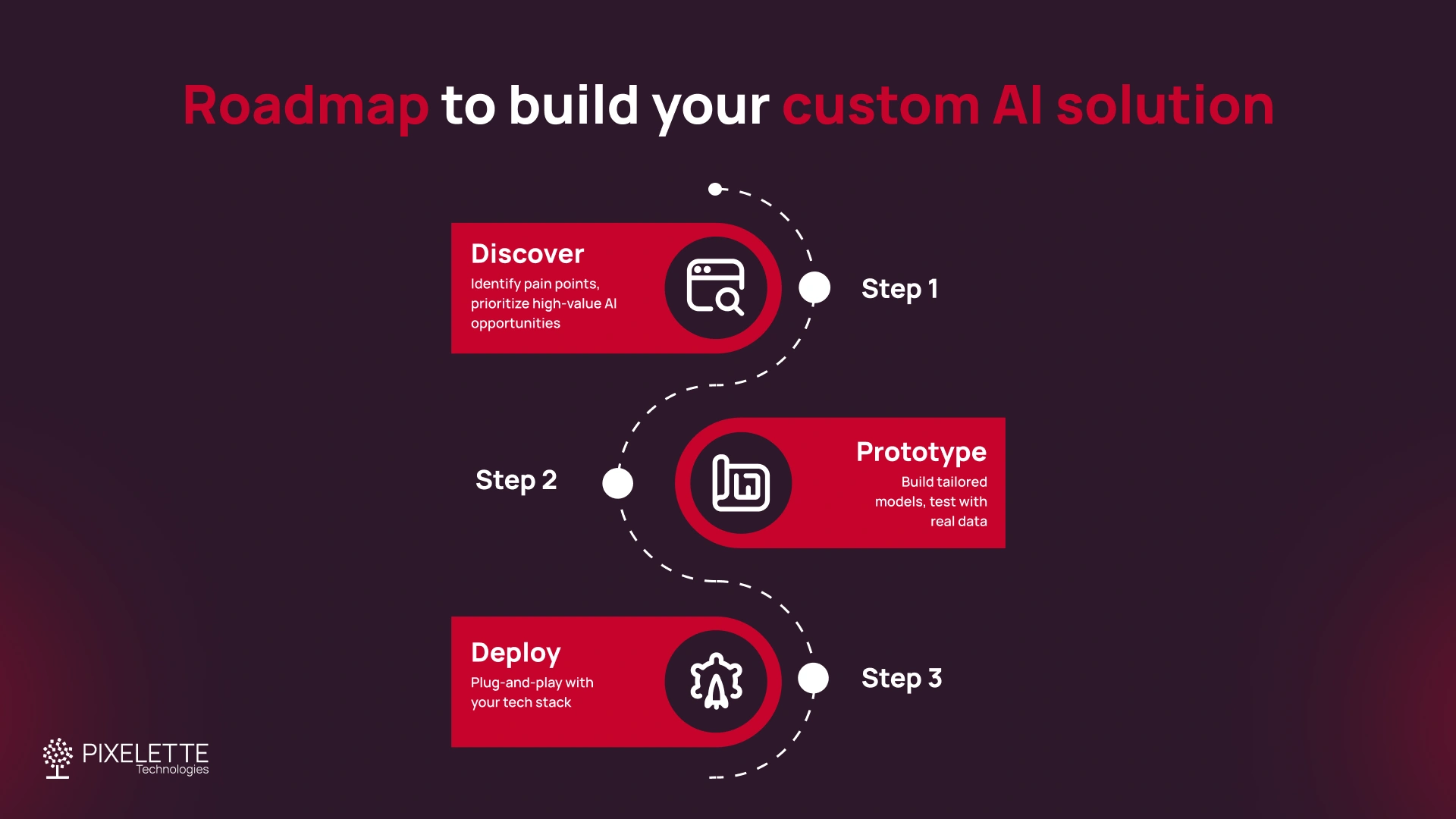10 High-Impact AI Business Solutions to Scale and Save Time
Written by
Maryam Aslam
Last Updated: June 27, 2025

In this article
The Future of AI Starts Here
Opt for our AI development services to create intelligent, scalable and efficient solutions. Let’s push the boundaries together. Get Started with a Free Consultation Now.
Every single minute your team manually spends on repetitive tasks is a minute wasted on growing your business. It’s like being stuck in a loop where you’re always busy but not making any meaningful progress. The good news? You don’t have to stay stuck. There are plenty of AI business solutions that enable companies to scale and save time spent on menial tasks, and instead put their resources to good use for winning their markets.
As operations become more complex, traditional automation tools fall short. Many businesses are now investing in AI development services that help them deploy custom AI business solutions aligned with their business goals, data, and workflows. This is something that goes beyond the scope of off-the-shelf tools. In this article, we’ll take you through 10 high-impact AI business solutions that show the real potential of what AI can do when built with a purpose. Let’s dive in!
10 AI solutions making a difference
1. Intelligent process automation for repetitive tasks
Real burnout begins when you are spending hours every day doing the same tasks. These repetitive tasks are silent killers of productivity. But with AI integration, these tasks can be easily handled within minutes.
Over the years, traditional robotic process automation (RPA) has helped to automate basic rule-based processes. Now, advanced AI automation has taken it to another level by integrating Natural Language Processing (NLP), machine learning, and computer vision. So, your system isn’t just following instructions, but also understanding and adapting according to the requirements.
Its application can be seen in finance, where teams can use AI to classify invoices by vendor, date, and payment status. If we talk about legal teams, they’re using AI to extract key clauses from lengthy contracts and triage incoming documents. Sounds like a distant reality, right? Wrong. These aren’t future possibilities, but rather real-world examples of how AI business solutions are making their way across various industries right now to speed up repetitive tasks and deliver with accuracy.
2. AI-driven customer support agents
Nowadays, customers do not want the same old robotic replies from chatbots. They expect instant and personalized responses to their queries. AI-driven customer support agents have addressed this problem by providing multilingual assistance and context-aware solutions.
These AI chatbots are trained based on past knowledge, experiences, product analysis, and even the tone of voice that enables them to respond with accuracy and relevancy. These chatbots are powered by large language models (LLMs) and can resolve issues, detect customer sentiments, and pass tickets to the right department. They continuously learn from past experiences to improve their performance. Whether you’re a SaaS company handling high volumes of customer queries, a fintech platform processing customers’ sensitive information, or an e-commerce store serving a global audience, an AI-driven customer support agent will consistently deliver timely responses and slash your support costs.
3. Predictive analytics for smarter forecasting
Previously, forecasting relied on spreadsheets and gut instinct, but with AI integration into businesses, predictions can be made with data-backed precision. Predictive analytics uses machine learning to analyze historical data, identify patterns, and generate real-time forecasts for everything. These systems stay up-to-date by integrating with the internal datasets and continuously adapting to real-time data.
This AI solution works well for different industries. In supply chain management, it can predict stock shortages before they disrupt the workflow. For finance teams, it supports revenue planning and budgeting. Similarly, the HR teams can use predictive analytics to identify at-risk employees and take proactive measures to prevent instability and disruption to company workflows.
4. Autonomous data labeling & management systems
Every powerful AI model you see is a result of an enormous amount of labeled data. However, manual data labeling is not only time-consuming and labor-intensive, but it also leaves room for human error and often becomes a hurdle for the team. Autonomous data labeling and management systems solve this problem by automating the tagging, sorting, and structuring of the data sets with the help of advanced AI solutions.
With the integration of autonomous data labeling and management systems, businesses can save time and resources required to train machine learning models. It is best for teams handling complex and high-volume datasets. It helps with organizing a large set of medical records, labeling satellite images, and processing customer interactions, ensuring accuracy and consistency. Autonomous data labeling is not just a choice but a necessity for businesses seeking to develop their own AI capabilities.

5. Personalization engines for web & app experiences
No two individuals share the same preferences, goals, or personalities. So, how come serving them with the same experience will build a trustworthy and loyal relationship between them and your business? It no longer works in today’s competitive digital landscape. This is where personalized AI web and app experiences come in.
By analyzing usage patterns, behavioral data, and historical interactions, tailored content and recommendations can be given in real-time across web and mobile platforms. For example, e-learning platforms assess a learner’s performance and preferences to suggest the most relevant courses. Similarly, e-commerce platforms recommend products and services based on a customer’s purchase history and interests. This helps to strengthen the customer-owner relationship.
Be it endorsing a new course, recommending a new product, or guiding users through the SaaS journey, it is all possible with systems' dynamic adaptation skills. It enhances customer satisfaction, boosts engagement, and strengthens and expands long-term relations without any manual intervention.
6. AI for cybersecurity monitoring and threat detection
Cyber threats are present-day realities one can simply not ignore. They are evolving in real-time, and can hit your business when you least expect it. To encounter this, your defense system needs to keep up. To help you with this, AI-powered cybersecurity tools provide strong protection by monitoring your networks around the clock, detecting glitches that a traditional system might miss, and analyzing user behavior to spot anything unusual.
With the help of these tools, security teams respond faster and more effectively. Rather than responding to a glitch after it has occurred, AI-powered cybersecurity opts for a preventive approach, recognizing any suspicious event, policy violation, or unusual file movements. As the threat evolves, so do the system’s threat detection skills. Having intelligent threat detection isn’t a luxury, rather a critical layer of defense.
7. AI assistants for internal knowledge management
You may need to access old information at any stage in your business, and searching through files, old records, and outdated emails can be a waste of time. AI assistants are now in demand because they can serve as intelligent knowledge partners, trained on your company's internal data.
With the help of that knowledge, these assistants can instantly respond to HR-related queries, guide employees through troubleshooting steps, and provide quick access to onboarding manuals, compliance guidelines, and sales playbooks. So, instead of waiting for hours to get the right information, employees can now get the required information in minutes through an AI assistant. It saves time and supports informed decision-making across teams.
8. NLP-powered compliance monitoring tools
One missed message or clause can turn into a costly compliance violation. That’s why now businesses are turning to AI for better real-time compliance monitoring. NLP-powered compliance tools can scan financial data, internal communication contracts, and transactional data to address potential issues before they escalate.
These AI solutions can be customized to support compliance with industry-specific regulations, such as GDPR for financial services, HIPAA in healthcare, and regional data privacy laws applicable to legal practices. This enables businesses to monitor compliance across operations regularly, speed up audits, and reduce the risks of expensive penalties. This AI solution for business will help you to stay focused on growth, rather than fearing the next audit.
9. Custom AI dashboards for C-suite intelligence
Executives are always looking for smarter insights instead of overwhelming dashboards and raw data. Custom AI-powered dashboards address this business problem and provide strategic data visibility, without getting lost in piles of raw data.
It consolidates performance metrics, business trends, and predictive alerts into a single, easy-to-use interface so that you can track what matters the most. This enables C-suite executives to evaluate growth opportunities, identify risks earlier, and make informed decisions. These tools are specifically built considering your business logic, internal datasets, and KPIs.
10. Vision-based AI for quality control & safety
Quality control and safety remain one of the most important factors to drive business success and maintain long-term stability. However, consistently monitoring products and safety protocols can be time-consuming and prone to human error. That’s why vision-based AI is in demand as it brings precision and consistency to ensure that the products are up to the standards. Vision-based AI empowers systems to look for defective products, flag safety violations, and ensure safety with operational protocols. It identifies the mislabelled packages, catches the assembly-line defects in manufacturing, and finds cracks in the construction process. This AI service for businesses helps to cut down costly rework, reduce inspection time, and maintain industry standards.

Conclusion
AI is not a one-size-fits-all solution. Every business has its own unique set of needs; they might be suffering from operational inefficiencies, poor customer experience, or limited revenue streams. So, the true value of AI lies in how precisely it is tailored to your specific business needs.
At Pixelette Technologies, we don’t offer off-the-shelf answers. We build custom AI solutions aligned with your data infrastructure, workflows, and strategic goals, serving businesses across different industries. Whether you're exploring new ideas or scaling existing AI efforts, we're here to help. Contact us today to discuss your AI business solution roadmap.




